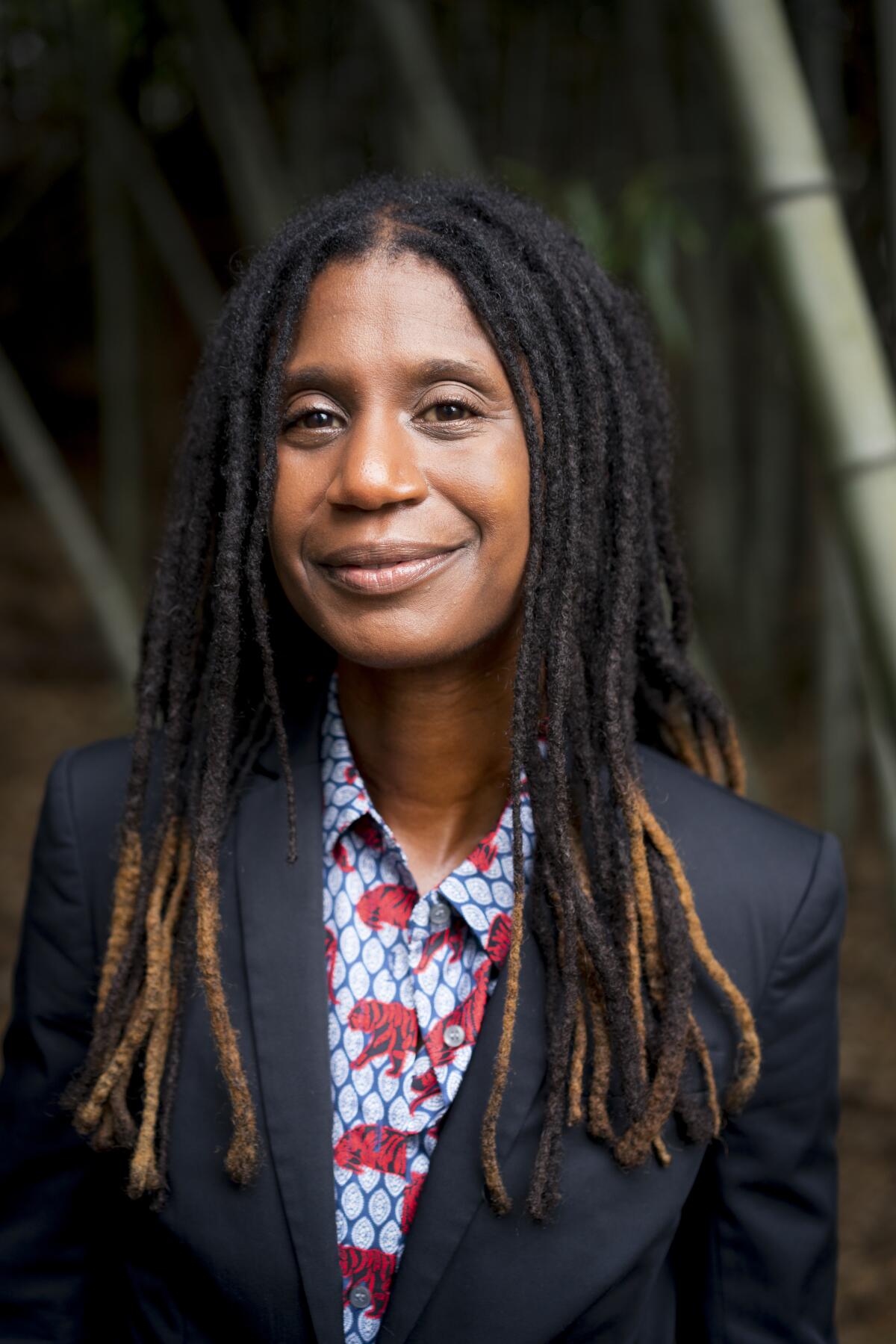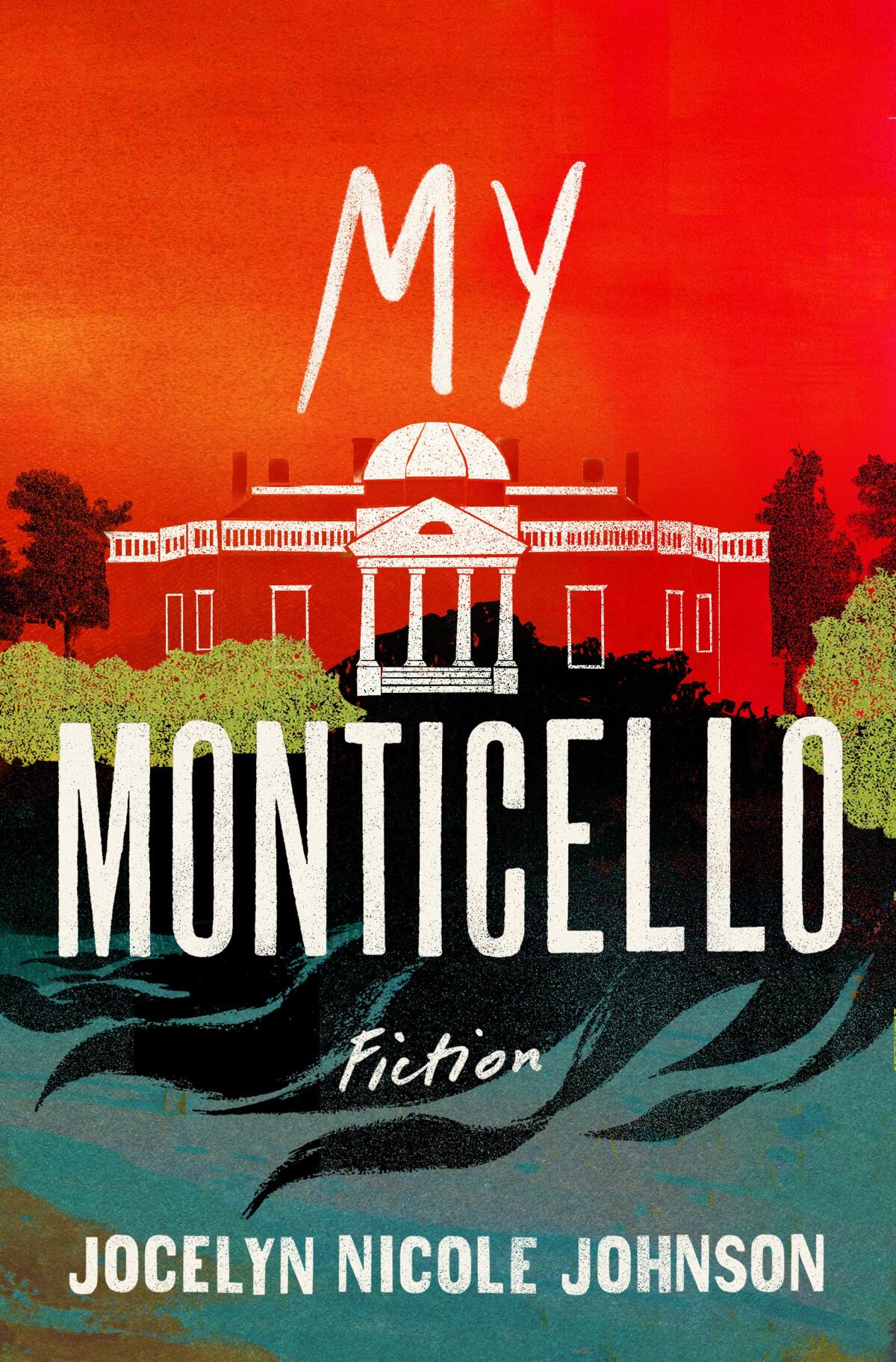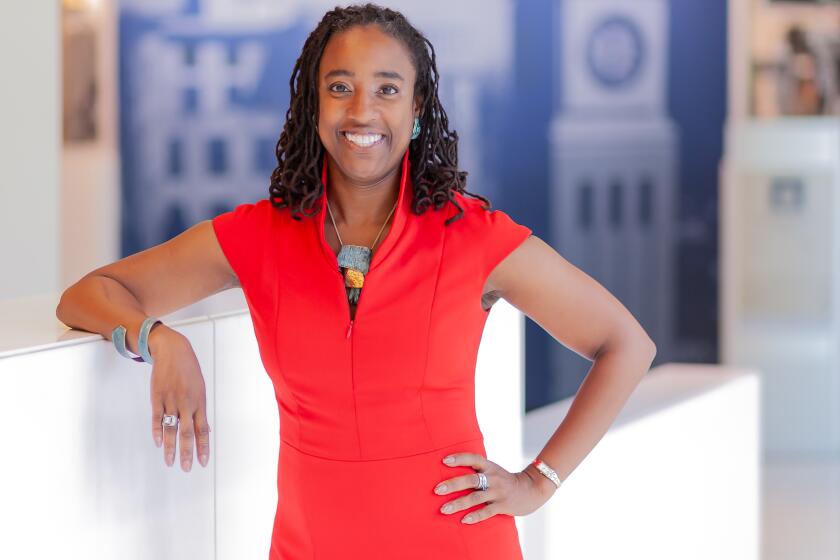How Charlottesville inspired short stories on race, terror and survival

On the Shelf
My Monticello
By Jocelyn Nicole Johnson
Henry Holt: 224 pages, $27
If you buy books linked on our site, The Times may earn a commission from Bookshop.org, whose fees support independent bookstores.
“DON’T SHOUT,” the library teacher shouts at her rambunctious elementary school charges. “Stop shouting or else! You all are so bad!”
Although the kids in Jocelyn Nicole Johnson’s short story “Something Sweet on Our Tongues” are quick with a retort — “How you going tell us, Don’t shout… when you the one shouting at all of us, right now?” — the teacher’s anger has already done its damage, pigeonholing children of color as troublemakers.
The title novella in Johnson’s debut collection of stories, “My Monticello,” takes a darker turn: In a dystopian near-future, a ragtag group of neighbors, including two descendants of Sally Hemings, take refuge from a racist attack at Thomas Jefferson’s hilltop estate.
“Men leapt from back seats, sprang out of truck beds, and rushed toward the faces of our homes,” Johnson writes. “White hands clutched metal canisters, swung torches topped in flames…. We saw a teen struck with the butt of a rifle, his temple spraying red.”
Reading these stories, you won’t be surprised to learn that Johnson has taught in public schools for decades — nor that she’s a longtime resident of Charlottesville, Va.
“’My Monticello’ is a reaction to the events of Aug. 12, which was a preview for Jan. 6,” Johnson says, referring in the first instance to the 2017 “Unite the Right” riot in Charlottesville. “That story is a reaction to reactions from President Trump but also to reactions closer to home. The law enforcement response didn’t feel protective.”
Kristin Henning has represented young Black defendents for decades. In ‘The Rage of Innocence,’ she makes a powerful case against police in schools
Johnson has been writing stories for years, but her work came into more intense focus even before the Charlottesville attack — in 2015, when three white officers bloodied a Black University of Virginia student, Martese Johnson, over an allegedly fake ID. (They later dropped the charge and settled a suit for $250,000). The opening story in “My Monticello,” titled “Control Negro,” was inspired by that incident. The title novella, which closes the collection, is being adapted into a film by Netflix.
“These stories are reflective of this specific moment,” Johnson said during a recent telephone interview. Her conversation with The Times has been condensed and edited.

How does teaching art to students shape you as a writer — both the teaching part and the art part?
I’m very interested in this idea of this community that you can create among people who are neighbors but who may not have much else in common, where you have to accentuate what you have in common to create a community. I used a lot of my ideas about teaching in the novella — a group of characters are pressed together — and I use some of my ideas about how you start a classroom and motivate people to work together.
I love visual art because it can get at things that are really hard to articulate. And with short stories, you can do that too. There’s a lot of space for things that are unsaid or for predicaments that you put the reader in — and let them sit there without fleshing out everything.
“Virginia Is Not Your Home” is the name of a story as well as a line in the novella. Was this feeling, or fear, driven by the domestic terrorism in Charlottesville or just life in America?
Absolutely both. I was born and raised in Virginia so it should be unequivocally home, but I’m a Black woman, and there are subtle but constant reminders about why you shouldn’t feel at home. That’s a constant pressure for many people of color in this country. The novella and some of the stories were a very visceral reaction to that sense of not feeling at home, not feeling safe and how it was highlighted in a very particular way in Charlottesville on Aug. 12.
Annette Gordon-Reed, Ayad Akhtar, Héctor Tobar, Martha Minow, David Kaye and Jonathan Rauch discuss the Jan. 6 riot and what we do about it.
My favorite line in the novella is one of the simplest, when Da’Naisha, a Charlottesville descendant of Sally Hemings, says: “I tried to keep my head up. I decided to keep my head up.” What did that line mean to you?
The internal toll that racism takes on people in the short and long term can be understated — even if you’re not physically hurt but if you recognize that people would like to see you harmed. That’s my experience of Aug. 12. It’s no surprise there are racist people or racist systems, but it certainly was a kind of harm to have people express it so publicly and so loudly and be in some ways protected and sanctioned. We knew it was coming; we anticipated it for a long time and we dealt with it for a long time.
When Da’Naisha Love says, “I decided to keep my head up,” it’s about the big question of the story: How do you respond to horror, to apocalypse, to violence? That was a question I had and people in my community had. Those questions are still unanswered. I thought about my character trying to deal with it by maintaining her humanity but also being strong.
In a moment of confrontation, she says she is “willing my voice steady and appeasing.” That feels like something Black Americans must all learn to do that white Americans don’t have to worry about.
Da’Naisha recognizes that it’s her responsibility to keep herself safe by suppressing what would be an ordinary human reaction to a horrible situation. That is something that is asked of people of color. If you are upset about something, even if it is extremely upsetting or dangerous, then you are the dangerous person.
Da’Naisha says of her white boyfriend, Knox, “I knew he wanted to protect me, to help me, yet he seemed unable to see me.” He is sincere and loving yet oblivious to his privilege. Was it tricky to create that character?
My hope was to make the characters individuals with a complicated way of being, neither all good nor all bad. They are all affected by racism, privilege and history in ways they are aware of and not aware of, and they’re trying to negotiate this experience together. It does come back to being an elementary school teacher. Everyone has their moments. Difficult people can deserve grace too.
Deesha Philyaw talks about the long gestation of her collection ‘The Secret Lives of Church Ladies,’ a Times Book Prize finalist for first fiction.
The book is filled with sadness, grieving and anger. How do you feel?
Hope is my way of being. None of us know precisely what is going to happen, but we have to figure out a way to be. Octavia Butler, who was a big influence for my writing, was once asked about whether there was any hope in her books. She said that predicting the future and offering warnings is a kind of hope, because you are focusing people’s attention on a problem and that is an invitation for us to do something different.
So I am saying, “Look at what’s happening.” What we do matters, and if we pay attention in a different way, we can make something different happen.
More to Read
Sign up for our Book Club newsletter
Get the latest news, events and more from the Los Angeles Times Book Club, and help us get L.A. reading and talking.
You may occasionally receive promotional content from the Los Angeles Times.







